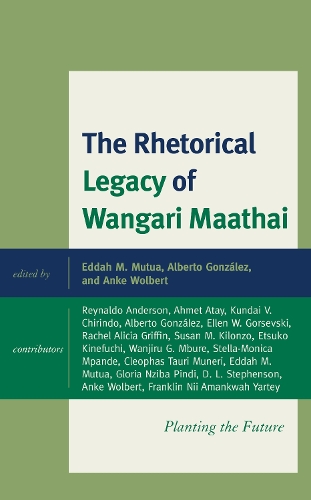
The Rhetorical Legacy of Wangari Maathai: Planting the Future
(Hardback)
Publishing Details
The Rhetorical Legacy of Wangari Maathai: Planting the Future
By (Author) Eddah Mbula Mutua
Edited by Alberto Gonzlez
Edited by Anke Wolbert
Contributions by Reynaldo Anderson
Contributions by Ahmet Atay
Contributions by Kundai V. Chirindo
Contributions by Alberto Gonzlez
Contributions by Ellen W. Gorsevski
Contributions by Rachel Alicia Griffin
Contributions by Susan M. Kilonzo
Bloomsbury Publishing PLC
Lexington Books
25th October 2018
United States
Classifications
Professional and Scholarly
Non Fiction
Feminism and feminist theory
333.72092
Physical Properties
Hardback
244
Width 160mm, Height 231mm, Spine 24mm
544g
Description
This book honors the advocacy of Dr. Wangari Maathai, acclaimed environmentalist and the first African woman to receive the Nobel Prize for Peace. Dr. Maathai was a gifted orator who crafted messages that imagined new possibilities for human agency and social justice and who inspired action to protect our natural habitats. This collection explores the various strategies Maathai employed in her speeches to create memorable images and arguments for audiences in Kenya and around the world. Specifically, authors examine Maathai's use of storytelling, her creative use of metaphor and local cultural knowledge, and her use of sharp social-political analysis. Authors approach Maathai's rhetoric from both African and Western ways of knowing.
Reviews
The Rhetorical Legacy of Wangari Maathai is a beautiful tribute to this Nobel Peace Prize winner and the idea that one personor even one fabled hummingbirdcan make a powerful difference. After completing this book, the reader will never think the same way about the importance of trees, our relationships with the earth, and the roles of rhetoric, culture, and spirituality in environmental justice movements. Specifically, this book makes important contributions and can be useful in courses that consider the intersections of environmentalism, feminism, and human rights; the role of rhetoric in social movements; intercultural communication; environmentalism as a justice issue; and the role of spirituality and religion in environmental justice work. -- Navita Cummings James, University of South Florida
What a gift! We need to have the words of this wise woman to guide us as we navigate a tumultuous time. Wangari Maathai advocated environmental activism as a path for healing on multiple levels. This book helps us to better understand that passion and her world view connecting nature and indigenous communities with the socialand social justice. Thank you to the editors for crafting a project that recognizes critical importance her vision and for giving voice to an African womans lived experience. -- Karla D. Scott, St. Louis University
Author Bio
Eddah M. Mutua is professor of intercultural communication at St. Cloud State University. Alberto Gonzlez is distinguished university professor in the School of Media and Communication at Bowling Green State University. Anke Wolbert is lecturer in the School of Communication, Media, and Theatre Arts at Eastern Michigan University
